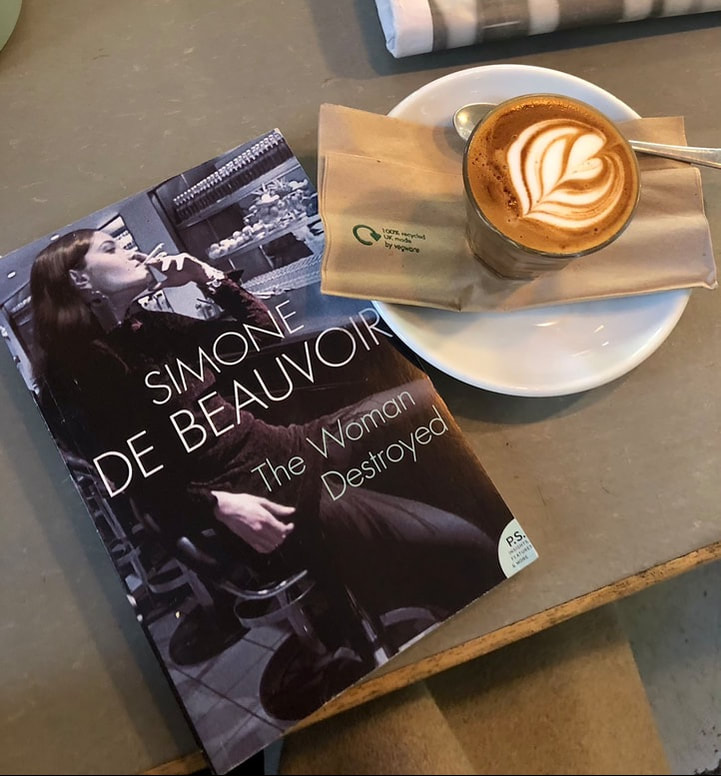The Woman Destroyed
Author: Simone De Beauvoir
Published by: Harper Perennial
Pages: 224
Format: Paperback
My Rating: ★★★★
Published by: Harper Perennial
Pages: 224
Format: Paperback
My Rating: ★★★★
First published in 1967, this book consists of three short novellas on the theme of women's vulnerability - in the first, to the process of ageing, in the second to loneliness, and, in the third, to the growing indifference of a loved one.
My thoughts:
In this collection, Simone de Beauvoir presents a trio of intensely readable novellas, first published in 1967. There are three stories that draw the reader into the lives of three women, all past their first youth, all facing unexpected problems. are forced to carry the burden - particularly marked in the final story, of social expectation. The three protagonists deal with changing circumstances and the men in their lives, and the stories are moving, complicated, nuanced, and brilliantly written.
Each story focuses on a woman. All three women are not only French, but specifically Parisian. And they each are in a crisis. Across all three stories is a sense of dependency and domination, living through others and living through appearances. Simone de Beauvoir has the gift of selecting detail and creating individuals. Her characters make sense of life on the page and when they discover the why in the actions of others, the reader is invited along for the journey.
The first novella, The Age of Discretion, centres around the aging process and the end of careers of both a husband and wife. I found this story really aesthetically pleasing in the descriptions of the narrator’s surroundings. The main character was relatable in a lot of ways, and in the story, we witness this successful scholar fast approaching middle age facing a double shock - her son's abandonment of the career she has chosen for him and the harsh critical rejection of her latest academic work.
“In earlier days I never used to worry about old people. I looked upon them as the dead whose legs still kept moving.”
The Monologue is an extraordinary New Year's Eve outpouring of abuse from a woman consumed with bitterness and loneliness after her son and her husband have left home. This is an abandoned, lonely woman whose bitterness knows no bounds. As she utters obscenities and wishes terrible things on her relatives, we get a glimpse of who she is as a person, and it is not easy to sympathise with her. Actually, it is not easy to read this one, and I found The Monologue stressful and unpleasant to read. The rambling, frenzied, desperate, punctuation-starved sentences put me on edge.
Finally, in The Woman Destroyed, De Beauvoir tells the story of Monique, trying desperately to resurrect her life after her husband confesses to an affair with a younger woman.
The main protagonist, Monique, undergoes a mid-life crisis and based on advice from a friend, consents to her husband having an affair. This turns out be nearly fatal for her. She discovers eventually during her conversations with him that this isn't the first time he has strayed from their marriage. It is interesting to note that Maurice, her husband, had in the beginning of their relationship made a fuss about life-long fidelity and later he cheats on the mother of his children. Since his current relationship with a professional lawyer, a woman who Monique despises for her supposed pretentious nature and history of several lovers, is heading towards becoming a serious one, Monique becomes fearful that Maruice will leave her for good. This last story presented (bit by bit) a woman’s life crumbling (as cliché as it is, because of a male).
Monique cannot live her life peacefully and is constantly seeking answers to questions that drive her crazy. The husband seems to be torn as well with this situation of sharing two women, but it is his wife who is clearly the victim here. Her married life had revolved around him and raising their two daughters; she did not become a working woman, something sadly he brings up as a flaw in her. He has a fairly successful and respectable career, his alone time with his mistress, and whatever pleasures he can afford for himself. She only has despair, frustration and a sense of loss of existence.
With her focus firmly on the inner lives of these three women, De Beauvoir somehow manages to be coolly analytical while still exploring the searing emotions that both make and unmake her female protagonists. The writing benefits from the author’s clear ability to write about emotion in terms of direct experience. The book is an excellent social observation and reflection of women's dependence on men, and it represents the emotional world of women. Incredibly personal, enraging, powerful, and devastating all at the same time.
The author plays with narrative form: a 1st person narrative, an inner monologue, a diary - and the three pieces build up an image of women and their fragile sense of identity and belonging. While de Beauvoir presents these three women in periods of crisis, some shorter, some longer, it is also clear that the roots of their sorrow run deep, their happiness built on unreliable foundations, they
What I found the most moving was the contrast of how all of these women started their stories (secure, accomplished, and self-confident), but ended up in a place of, seemingly, no return to their past lives.
I was emotionally affected by these fiction stories. I spent the entire afternoon enraged at my husband (I do not have a husband.) But the wonderful writing of De Beauvoir made me feel as if the grief, anguish, and yearning for freedom from pain were all mine.
Overall reaction:
In this collection, Simone de Beauvoir presents a trio of intensely readable novellas, first published in 1967. There are three stories that draw the reader into the lives of three women, all past their first youth, all facing unexpected problems. are forced to carry the burden - particularly marked in the final story, of social expectation. The three protagonists deal with changing circumstances and the men in their lives, and the stories are moving, complicated, nuanced, and brilliantly written.
Each story focuses on a woman. All three women are not only French, but specifically Parisian. And they each are in a crisis. Across all three stories is a sense of dependency and domination, living through others and living through appearances. Simone de Beauvoir has the gift of selecting detail and creating individuals. Her characters make sense of life on the page and when they discover the why in the actions of others, the reader is invited along for the journey.
The first novella, The Age of Discretion, centres around the aging process and the end of careers of both a husband and wife. I found this story really aesthetically pleasing in the descriptions of the narrator’s surroundings. The main character was relatable in a lot of ways, and in the story, we witness this successful scholar fast approaching middle age facing a double shock - her son's abandonment of the career she has chosen for him and the harsh critical rejection of her latest academic work.
“In earlier days I never used to worry about old people. I looked upon them as the dead whose legs still kept moving.”
The Monologue is an extraordinary New Year's Eve outpouring of abuse from a woman consumed with bitterness and loneliness after her son and her husband have left home. This is an abandoned, lonely woman whose bitterness knows no bounds. As she utters obscenities and wishes terrible things on her relatives, we get a glimpse of who she is as a person, and it is not easy to sympathise with her. Actually, it is not easy to read this one, and I found The Monologue stressful and unpleasant to read. The rambling, frenzied, desperate, punctuation-starved sentences put me on edge.
Finally, in The Woman Destroyed, De Beauvoir tells the story of Monique, trying desperately to resurrect her life after her husband confesses to an affair with a younger woman.
The main protagonist, Monique, undergoes a mid-life crisis and based on advice from a friend, consents to her husband having an affair. This turns out be nearly fatal for her. She discovers eventually during her conversations with him that this isn't the first time he has strayed from their marriage. It is interesting to note that Maurice, her husband, had in the beginning of their relationship made a fuss about life-long fidelity and later he cheats on the mother of his children. Since his current relationship with a professional lawyer, a woman who Monique despises for her supposed pretentious nature and history of several lovers, is heading towards becoming a serious one, Monique becomes fearful that Maruice will leave her for good. This last story presented (bit by bit) a woman’s life crumbling (as cliché as it is, because of a male).
Monique cannot live her life peacefully and is constantly seeking answers to questions that drive her crazy. The husband seems to be torn as well with this situation of sharing two women, but it is his wife who is clearly the victim here. Her married life had revolved around him and raising their two daughters; she did not become a working woman, something sadly he brings up as a flaw in her. He has a fairly successful and respectable career, his alone time with his mistress, and whatever pleasures he can afford for himself. She only has despair, frustration and a sense of loss of existence.
With her focus firmly on the inner lives of these three women, De Beauvoir somehow manages to be coolly analytical while still exploring the searing emotions that both make and unmake her female protagonists. The writing benefits from the author’s clear ability to write about emotion in terms of direct experience. The book is an excellent social observation and reflection of women's dependence on men, and it represents the emotional world of women. Incredibly personal, enraging, powerful, and devastating all at the same time.
The author plays with narrative form: a 1st person narrative, an inner monologue, a diary - and the three pieces build up an image of women and their fragile sense of identity and belonging. While de Beauvoir presents these three women in periods of crisis, some shorter, some longer, it is also clear that the roots of their sorrow run deep, their happiness built on unreliable foundations, they
What I found the most moving was the contrast of how all of these women started their stories (secure, accomplished, and self-confident), but ended up in a place of, seemingly, no return to their past lives.
I was emotionally affected by these fiction stories. I spent the entire afternoon enraged at my husband (I do not have a husband.) But the wonderful writing of De Beauvoir made me feel as if the grief, anguish, and yearning for freedom from pain were all mine.
Overall reaction:


